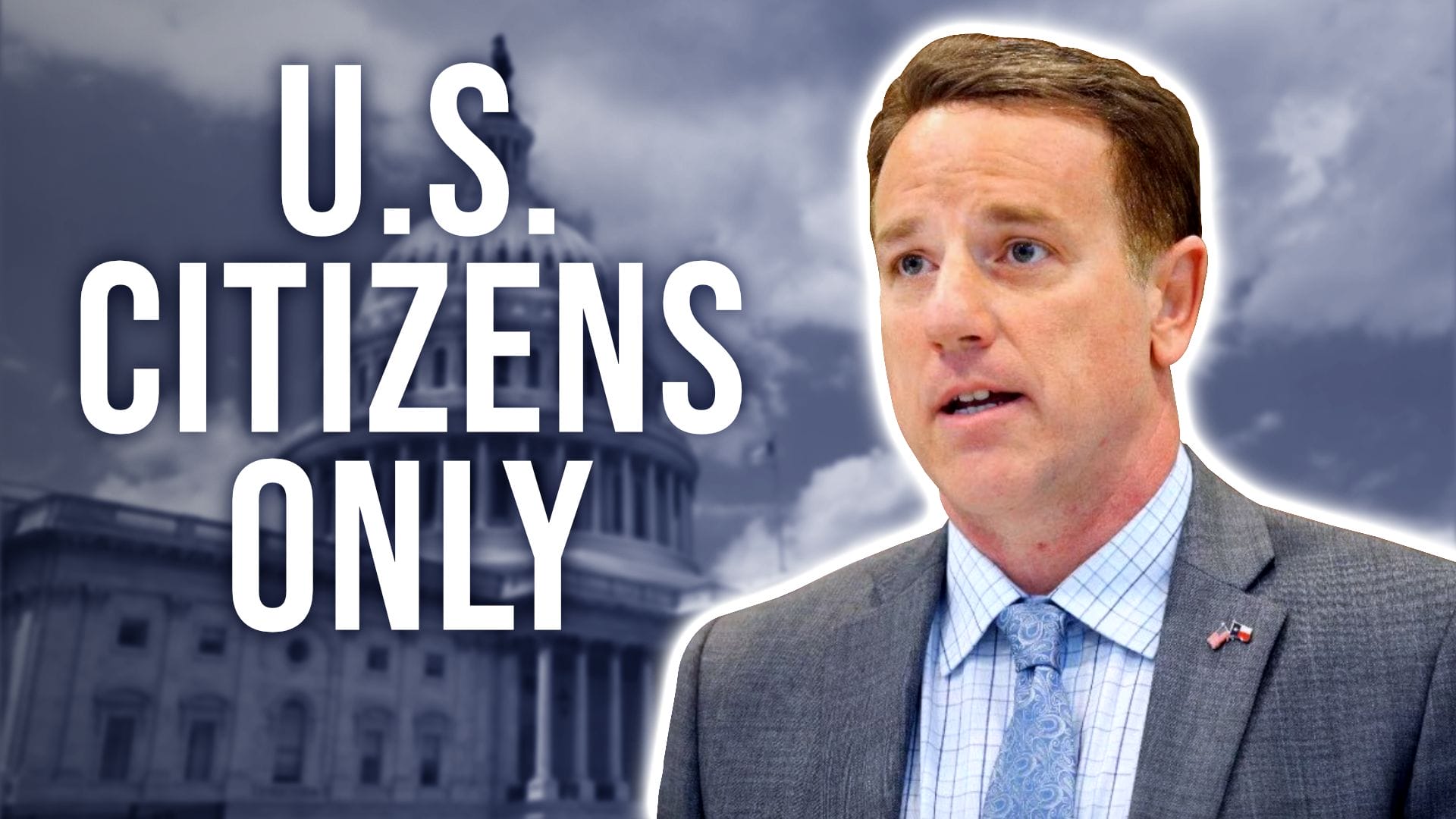US Representative Pat Fallon from Texas filed a bill this week to amend the National Voter Registration Act of 1993 to include a citizenship requirement for voter registration.
We like to think of voting as a quintessential American institution, but we’re wrong. We did perhaps invent the representative democratic republic, but many other nations’ people vote to this day. We like to think our elections are the freest and fairest in the world, but that’s certainly debatable. From 1860 to 2020, from Abraham Lincoln to Rutherford Hayes all the way to Joe Biden, questionable and contentious elections are a part of our history. On the left, the idea that “everyone gets a voice” is primary. On the right, it’s more like “nobody gets a voice who gets it illegitimately.”
Voting in America was originally limited to white male property owners, with the particulars left to the states. By the 1820’s the property ownership requirement was lifted. The 15th amendment in 1870 extended the right to vote to blacks and former slaves, and it wasn’t until the 19th amendment in 1920 that women were given the right to vote. The Voting Rights Act of 1965 added protections and did away with discriminatory voting practices like poll taxes and literacy tests, and put some states’ voting procedures under federal oversight.
My point in reviewing the history is this: voting in America has always been controversial. Further the idea that we would go back to voting “the old ways” is seldom mentioned, and further expanding the franchise is the current cultural impulse.
The most recent controversies have been about “voter ID” and the expansion of mail-in ballots during the Covid 19 pandemic. New to the fray, in October the city council of Washington DC put forward a bill that would allow undocumented immigrants and non-citizens to vote in municipal elections. We’ve also seen some recent reversals, with the Supreme Court declaring parts of the 1965 Voting Rights Act unconstitutional. Following that decision, multiple states passed “more restrictive” voting legislation.
In response, we’re now seeing bills like Fallon’s that would restrict voting in Federal elections to citizens only, by requiring proof of citizenship at the time of voter registration.
I can’t tell you what the liberals or the Yankees think, but I can make a good run at how we see voting in Texas.
First, everyone qualified should vote. If you are who you say you are, not representing someone else, you should vote. That’s all voter ID is really about.
Second, some people are not qualified to vote. People who aren’t who they say they are shouldn’t vote under false pretenses. People who harvest or falsify votes on behalf of others, those votes shouldn’t count. Within the category of people who shouldn’t vote are people who don’t have standing. For example, no one questions why I as a Texan can’t just walk in and vote for a school board member or governor in Illinois. It is no stretch to consider that if you came here outside of the legal pathway, perhaps the path you chose disqualifies you from having a say in how we run things around here. Likewise, some folks who commit certain crimes have forfeited their right to vote.
It’s also fundamental that every vote should count. If you’re qualified to vote for something, your vote should be accurately recorded, tabulated, and reported. Even with all the “advanced technology” these days, some states struggle with this fundamental. From “hanging chads” all the way to 20” ballots on 19” paper, human error and perhaps a bit of malicious behavior have cast huge parts of the process into question.
It is problematic that the presidency of the United States, and therefore the president over the state of Texas, comes down to a couple of counties in Georgia. It’s problematic that Congress is so dysfunctional that “control” comes down to a few counties in Georgia, Arizona, and Pennsylvania. It’s reminiscent of 1860, when divisions abound, doubt is high, and many are unhappy.
All I want is an honest vote, by honest and informed people. The Texas Constitution guarantees that all political power is inherent in the people, and that we have at all times the right to alter, reform, or abolish our government as we think expedient.
When we get the vote on Texas independence, it had damn well better be honest.
When we negotiate the terms of voting in the new Republic, we had better carefully consider who votes and how.
When we allow malicious actors, people with no stake in the game, people who don’t belong here, or perhaps even people who are uninformed and pick based on the jersey color of their candidate, we give away our sovereignty.
So, Mr. Fallon, your point is an obvious one: no one who is not a citizen of the country should vote in the country’s elections. On the other hand, any resident, legal or not, is perhaps entitled to a vote for school board or city council. In that case, the standing to vote comes not from citizenship, but from residency of the area under consideration.
Texas will vote to leave the union based on the current voting rules. After that, just like when the US invented representative democracy, Texas will be free to set its own course, including its own voting rules. I personally hope we’ll find a better balance between “rights” and “responsibilities” in our voting system, and that we’ll solve the problems of malicious actors, human error, and basic structural integrity.





Login to leave a comment